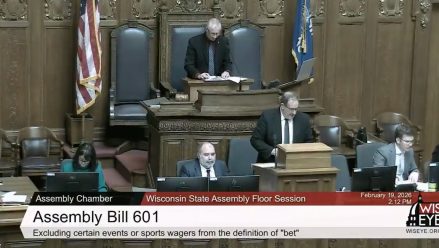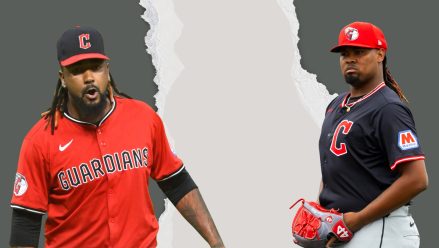The Nevada Gaming Control Board Wednesday afternoon revealed that it had “accepted the surrender” of FanDuel parent company Flutter’s “Order of Registration” and any other licenses, and “granted administrative approval of requests to withdraw all pending applications” for wagering by DraftKings. Nevada is one of a handful of states that have warned licensed sports betting operators off of getting involved in prediction markets.
FanDuel currently operates one retail sportsbook in partnership with Boyd Gamng at the Fremont Hotel and Casino in Las Vegas, but is not licensed for digital betting. DraftKings does not operate in Nevada. The state requires consumers to register for digital platforms in person, and DraftKings does not have a location at which to do that.
The NGCB posted the news about five minutes before Flutter’s third-quarter earnings report, in which it announced that FanDuel would go live with prediction markets in partnership with CME next month. FanDuel Predicts will only be available in markets where legal sports betting is not allowed, the company said. Both DraftKings — which announced in Nov. 6 that it will launch sports events contracts as part of its prediction market “in the coming months” — and FanDuel said they will geofence out Indian Country in states where they launch prediction markets.
“While we are enthusiastic about expanding FanDuel’s presence in Nevada, our views of the current opportunity for prediction markets outside of regulated states is unfortunately in direct opposition to Nevada’s priorities for its licensed operators,” a FanDuel spokesperson told InGame via email Wednesday. “As a result, we are making the difficult decision to voluntarily surrender our license. We look forward to resuming our Nevada efforts in the future as circumstances allow.”
In a statement to InGame, DraftKings Chief Compliance Officer Jen Aguiar wrote, “DraftKings holds its gaming licenses in the jurisdictions where we operate in the highest regard. As part of our ongoing commitment to regulatory compliance, we have withdrawn our inactive application in Nevada.”
In its Notice to Licensees, the NGCB wrote, “It has been made clear to the Board that Flutter Entertainment/FanDuel and DraftKings intend to engage in unlawful activities related to sports event contracts. This conduct is incompatible with their ability to participate in Nevada’s gaming industry.”
Will prediction market foray be worth it?
Several industry sources questioned DraftKings’ and FanDuel’s decisions to move forward with prediction markets and test regulators. With multiple court cases still pending, it remains unclear how or if prediction markets — which are currently defined as financial tools — fit into the legal betting landscape.
Both companies appear to believe that the risk is worth taking.
“We have had conversations with different stakeholders over time and Nevada was amongst that,” Flutter CEO Peter Jackson said during the company’s third-quarter earnings call Wednesday. “We did have a license in Nevada but we didn’t have B2C operations there, we were supporting Boyd. It’s sad to have to surrender the license but that’s what we’ve done. Nevada [is] protecting their interest, we’re protecting our interest and FanDuel Predicts will allow us to go after the half of the market we hadn’t been able to go after.”
Said DraftKings’ Aguiar, “Prediction markets are federally regulated by the Commodity Futures Trading Commission (CFTC), and we remain dedicated to working collaboratively with regulators to uphold the highest standards of integrity in our operations.”
Status of prediction markets remain murky
Actions by a Nevada judge may best sum up the situation — U.S. District Court Judge Andrew P. Gordon in June ruled that Kalshi could keep offering its products, but in October banned Crypto.com from offering sports event contracts.
After the Crypto.com ruling, Nevada became the first state to enforce such a ban, and Crypto.com took down its sports event contract Nov. 3. A Maryland district court judge ruled against Kalshi in another lawsuit, granting a preliminary injunction that required the platform to exit the state. But state regulators agreed to allow Kalshi to continue to operate until the case is fully resolved.
Nevada regulators, along with those in Arizona, Ohio, and others, have sent guidance to betting operators that involvement in prediction markets even outside of the jurisdiction in question could put their licenses in peril. The question now is if other regulators will follow Nevada’s lead.
“Several other regulators in the country have taken notice to predictive markets and other questionable activities,” a longtime industry observer told InGame. “Nevada sent a clear message to provide other regulators with the roadmap going forward. Hopefully, others will follow on this important issue to the regulated gaming market.”
Both companies have vowed to only operate in states where they do not have sports betting licenses, but as the NGCB showed, that may not be enough to appease regulators. At the same time, as Nevada moves forward with its enforcement action, similar action from other regulators could create a situation where regulators are penalizing state-licensed sportsbooks while federally licensed prediction markets continue to operate outside of state regulation.
Arguably, the NGCB enforcement action is somewhat symbolic. DraftKings and FanDuel own more than 80% of the U.S. digital sports betting market, but do not operate in Nevada, meaning the state won’t be losing much in tax revenue. The two companies are the market leaders in Arizona, Ohio, and every other legal digital wagering state they operate in.
The potential loss of tax revenue is just one more piece of the current conundrum — prediction markets are licensed and regulated by the CFTC while traditional sportsbooks are licensed by states. When the Professional and Amateur Sports Protection Act was overturned in 2018, sports betting became a states’ rights issue. In 2025, CFTC-licensed platforms are offering a product that looks a lot like sports betting, but is not currently defined as such.







